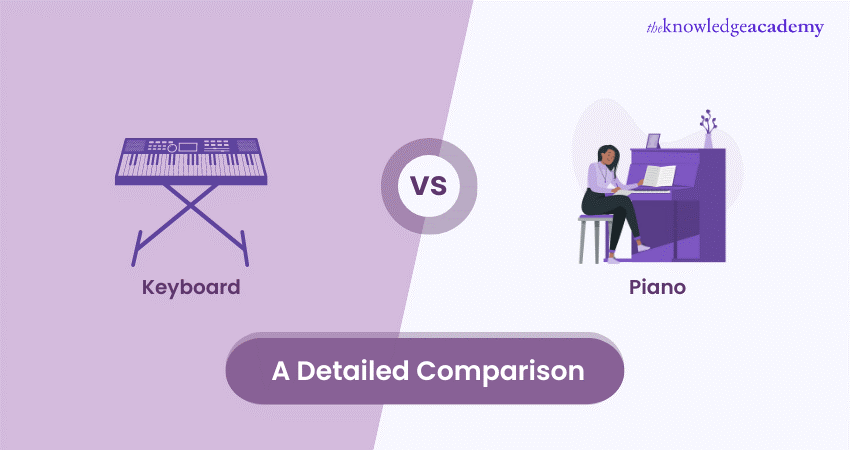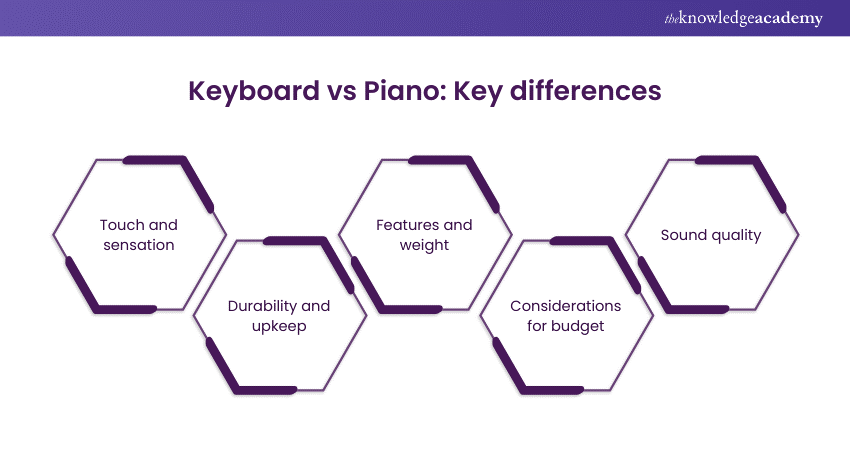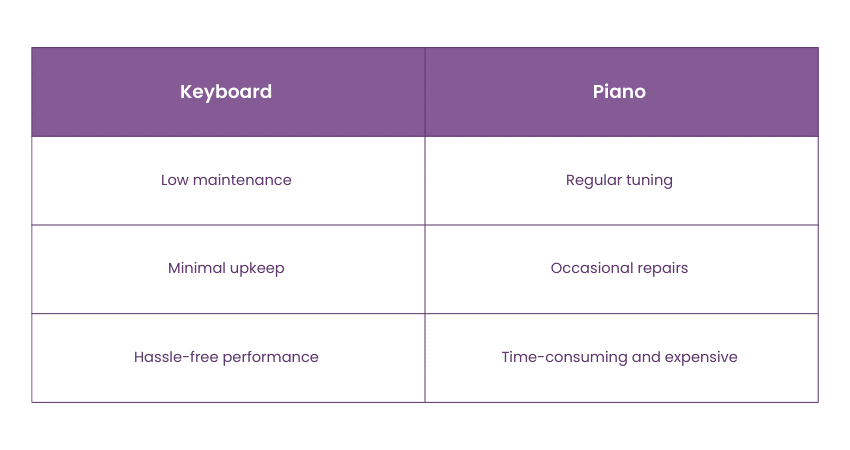We may not have the course you’re looking for. If you enquire or give us a call on +49 8000101090 and speak to our training experts, we may still be able to help with your training requirements.
Training Outcomes Within Your Budget!
We ensure quality, budget-alignment, and timely delivery by our expert instructors.

Have you ever wondered about the differences between Keyboard and Piano? In the world of music, choosing between Keyboard vs Piano is a common dilemma. Each instrument has its own unique qualities, making it important to choose the one that suits you best. Let's explore the distinctions between these two popular instruments to help you make the right decision for your musical journey.
Understanding the little details, like how they feel and sound and how they need to be taken care of, can help you make a smart choice. Whether you like the classic style of a Piano or the flexibility of a Keyboard, this journey will help you find your perfect match. So, let’s dive in and explore the differences between Keyboard vs Piano.
Table of Contents
1) Keyboard vs Piano: Key Differences
a) Touch and Sensation
b) Durability and Upkeep
c) Features and Weight
d) Considerations for Budget
e) Sound Quality
2) Conclusion
Keyboard vs Piano: Key Differences
In this section, we'll explore the main difference between Piano and Keyboard. Understanding these distinctions will help you choose the instrument that aligns best with your preferences and goals.

1) Touch and sensation
The touch and feel of keys can significantly impact your playing experience. Pianos offer weighted keys that mimic the feel of an acoustic Piano, providing a more authentic touch sensation. Keyboards, on the other hand, come with various key types, from semi-weighted to synth-action, catering to different preferences and playing styles.
2) Durability and upkeep
Pianos are known for their durability, often lasting for generations with proper maintenance. However, they require regular tuning and occasional repairs, which can be costly. Keyboards are generally more portable and require minimal maintenance, making them a convenient option for gigging musicians or those with limited space.
3) Features and weight
Keyboards have a plethora of features like built-in sounds, effects, and recording capabilities. It offers versatility and flexibility to explore different musical genres. They are also lighter and more portable, ideal for musicians on the go. Pianos have fewer features compared to Keyboards. It has a timeless elegance and presence that can elevate any performance or space.
4) Considerations for budget
Budget plays a crucial role in deciding which instrument suits your needs. Keyboards are generally more affordable, with a wide range of options to fit any budget. Pianos have a higher price and hold their value over time. They can be seen as an investment for serious pianists or those prioritising authenticity and tradition.
Learn how to play Keyboard with our Keyboard Instrument Course. Join today!
5) Sound quality
The sound quality of Pianos is unparalleled, with rich, resonant tones that fill the room and evoke deep emotions. However, the sound quality may vary based on the different Types of Pianos. Keyboards offer a vast array of sounds, from realistic Piano simulations to exotic instruments and electronic effects. It provides endless sonic possibilities for creative expression.
6) Number of keys
Pianos generally have 88 keys. It spans over seven octaves that allow for a variety of expression and repertoire. Keyboards come in different sizes, ranging from compact 25-key controllers to full-sized 88-key models. It caters to different needs and skill levels.
7) Action
Action refers to how keys respond to touch and produce sound. Pianos feature graded hammer action, where keys are heavier in the lower register and lighter in the higher register. It simulates the feel of an acoustic Piano. Keyboards offer different types of action, including weighted, semi-weighted, and non-weighted, providing options for players of all levels.
Master advanced Piano techniques with our Piano Course - Register today!
8) Maintenance

Maintaining a Piano requires regular tuning, regulation, and occasional repairs, which can be time-consuming and expensive. Keyboards are low-maintenance instruments, requiring minimal upkeep and offering hassle-free performance for busy musicians or casual players.
9) Ideal player
Your playing style, musical goals, and lifestyle will ultimately determine which instrument is right for you. Pianos are well-suited for classical pianists, serious students, or those seeking a traditional playing experience. Keyboards are ideal for versatile musicians, producers, or anyone looking for a portable, multifunctional instrument to explore different genres and sounds.
Give wings to your dream to become a Music Producer with our Music Production Course – join now!
Conclusion
The choice between a Keyboard vs Piano is personal. Each instrument has its own unique qualities, which encourage you to try out different melodies and express your feelings. It helps you enjoy exploring music and trying out different sounds. Whether you're drawn to the timeless elegance of the Piano or the versatility of the Keyboard, remember it's not about which one wins but about the music you create.
Enhance your knowledge of Filmmaking with our Filmmaking Masterclass. Sign up now!
Frequently Asked Questions

Keyboards are often preferred due to their affordability, portability, and versatility in sound options. They offer built-in lessons and accompaniments, making learning more interactive. Pianos are more expensive and provide a more authentic playing experience. It can be beneficial for developing proper techniques from the start.

Keyboards offer convenience and versatility. However, they may not fully replace the experience of playing a Piano, especially for serious practice and performance. Pianos provide a nuanced touch response and rich sound quality that is hard to replicate with electronic Keyboards.

The Knowledge Academy takes global learning to new heights, offering over 30,000 online courses across 490+ locations in 220 countries. This expansive reach ensures accessibility and convenience for learners worldwide.
Alongside our diverse Online Course Catalogue, encompassing 17 major categories, we go the extra mile by providing a plethora of free educational Online Resources like News updates, Blogs, videos, webinars, and interview questions. Tailoring learning experiences further, professionals can maximise value with customisable Course Bundles of TKA.

The Knowledge Academy’s Knowledge Pass, a prepaid voucher, adds another layer of flexibility, allowing course bookings over a 12-month period. Join us on a journey where education knows no bounds.

The Knowledge Academy offers various Hobbies and Interests courses, including a Piano Course, Guitar Course, and Music Production Course. These courses cater to different skill levels, providing comprehensive insights into Essential Guitar Techniques.
Our Business Skills Blogs cover a range of topics related to musical instruments, offering valuable resources, best practices, and industry insights. Whether you are a beginner or looking to advance your skills as a Music Producer, The Knowledge Academy's diverse courses and informative blogs have you covered.







 Top Rated Course
Top Rated Course




 If you wish to make any changes to your course, please
If you wish to make any changes to your course, please


